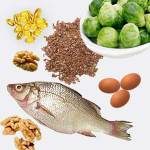The 411 on Fats
Foodpicker Question: I have pre-diabetes and am confused about fats. A friend was telling me there are “healthier fats” I should be including in my diet. I thought all fats were bad? Could you tell me which fats I should include in my diet (if any)?
This is a very good question. With the many fad diets and fat-free diet trends, it’s easy to become confused on the purpose of fat and their role in our diet. First let me start off by saying that not all fats are bad. We need fat in our daily diets and without it our body would not function properly. However, there is a limit on the amount of fat we should consume daily and recommendations on the types of fats we should consume. According to the American Heart Association, we should:
- Limit total fat intake to less than 25-35% of total calories daily
- Limit saturated fat intake to less than 7% of total calories daily
- Limit trans fat intake to less than 1% of total calories daily
- Limit cholesterol intake to less than 300 mg/day, for most people
- Consume the remaining fats from polyunsaturated and monounsaturated sources; such as nuts, seeds, and vegetable oils
So, what does all this mean? Well, first let’s identify what all these fats are…
 Saturated fat is mainly found from sources of animal origin; such as eggs, red meat, poultry, dairy, and butter/lard. Saturated fatty acids are typically solid at room temperature and have a high melting point. All that means is that it will melt easily or melt at room temp. These types of fats, if eaten in excess, can be detrimental to our health. They increase the risk of heart disease by raising the “bad” cholesterol, LDL or low-density lipoprotein, and total cholesterol. Furthermore, since our body can synthesize saturated fat from the healthy fats we consume, it is unnecessary for us to take in copious amounts from outside sources.
Saturated fat is mainly found from sources of animal origin; such as eggs, red meat, poultry, dairy, and butter/lard. Saturated fatty acids are typically solid at room temperature and have a high melting point. All that means is that it will melt easily or melt at room temp. These types of fats, if eaten in excess, can be detrimental to our health. They increase the risk of heart disease by raising the “bad” cholesterol, LDL or low-density lipoprotein, and total cholesterol. Furthermore, since our body can synthesize saturated fat from the healthy fats we consume, it is unnecessary for us to take in copious amounts from outside sources.
 Trans fat, also known as partially hydrogenated oil, is another type of unhealthy fat. These types of fats are unsaturated fats with an unusual shape which causes them to be solid at room temperature. There are few trans fats naturally occurring in nature, but for the most part they are synthesized from a process known as, hydrogenation. Hydrogenation is a technique used by food manufacturers to extend the shelf life of products. This process involves chemically altering a liquid vegetable oil to make it act as a solid fat by increasing the amount of hydrogen bonds. Basically something natural was turned into something unnatural. Ever wonder how pastries and processed foods can stay on a shelf for extended periods of time without putrefying? This is an example of changing something highly perishable into something undesirable, even for microbes, which are responsible for the spoilage of foods.
Trans fat, also known as partially hydrogenated oil, is another type of unhealthy fat. These types of fats are unsaturated fats with an unusual shape which causes them to be solid at room temperature. There are few trans fats naturally occurring in nature, but for the most part they are synthesized from a process known as, hydrogenation. Hydrogenation is a technique used by food manufacturers to extend the shelf life of products. This process involves chemically altering a liquid vegetable oil to make it act as a solid fat by increasing the amount of hydrogen bonds. Basically something natural was turned into something unnatural. Ever wonder how pastries and processed foods can stay on a shelf for extended periods of time without putrefying? This is an example of changing something highly perishable into something undesirable, even for microbes, which are responsible for the spoilage of foods.
Now, to answer your question on which fats you should include in your diet. The healthy fats your friend was referring to are called polyunsaturated fats and monounsaturated fats. These fats not only lower your “bad” cholesterol, they also help raise your “good” choleste rol, also known as HDL or high-density lipoproteins.
rol, also known as HDL or high-density lipoproteins.
Monounsaturated & Polyunsaturated fats are liquid at room temperature. These types of fats turn rancid very quickly due to their innate nature to combine with oxygen in the air. It is important to keep these types of fats in the refrigerator or closed tightly in their respective containers. The most common type of unsaturated fatty acids are found in certain plant oils; such as, olive, sunflower, canola, peanut, soy, sesame, avocado, as well as nuts & seeds. Here is a list of other sources of healthy fats.
Another type of healthy fat, found primarily in fish oils, is called Omega 3-fatty acids. The best food sources to acquire these essential fatt y acids are from fatty fish (salmon, herring, and mackerel, to name a few) or from cold water fish supplements. However, the body prefers to extract vitamins and minerals from whole foods; therefore, acquire most, if not all, of your nutrients from food sources, if possible. [Disclaimer: Some people require Omega 3 supplementation, such as those with documented heart disease or high triglycerides (blood fats). Please consult your physician if you have questions or concerns]. It is also beneficial to mention that flaxseed oil (linseed oil) is also an excellent source of Omega 3’s. Click here to learn more about the benefits of flaxseed oil.
y acids are from fatty fish (salmon, herring, and mackerel, to name a few) or from cold water fish supplements. However, the body prefers to extract vitamins and minerals from whole foods; therefore, acquire most, if not all, of your nutrients from food sources, if possible. [Disclaimer: Some people require Omega 3 supplementation, such as those with documented heart disease or high triglycerides (blood fats). Please consult your physician if you have questions or concerns]. It is also beneficial to mention that flaxseed oil (linseed oil) is also an excellent source of Omega 3’s. Click here to learn more about the benefits of flaxseed oil.
So, to sum up which fats you should or shouldn’t eat, it is recommended to consume more of the healthy fats; such as those mentioned above, and less of the fats that cause heart disease and other health complications. Always choose MOP, which is an acronym I coined during my nutrition studies.
M onounsaturated fat
O mega 3-fatty acids
P olyunsaturated fat
Good luck and I hope this clarified your confusion on fats!
Tam